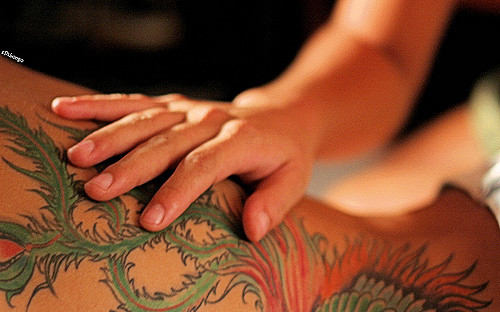When did touch become a dirty word or action?
I remember when I was a kid at school and falling and hurting my knee, a teacher gave me a hug, rubbed my knee and held my hand as he walked me, sobbing to the sink to clean off the dirt. The touch was soothing, comforting and calmed me down in a way that words would not.
I became a teacher. I was told that I could not touch my students. “What?!” I asked incredulously. “Why?!”
“Because it could be misinterpreted—it is for your own safety. Oh, and if you ever need to speak one-on-one to a student. Leave the door open.”
This is the lost art of human connection.
We live in a sterile environment in North America. We are told to use antibacterial soap which has contributed to super bugs; we are encouraged to wipe down shopping carts before we use them; and now we are being told not to touch other human beings. All of which have contributed to a lack of connection between people. Why do you think a touch pad, phone or device is so desirable? Because people long to touch—and be touched.
However, machines cannot replace human contact.
Science is finally supporting the health and wealth benefits of touch. A few seconds of friendly contact releases oxytocin, decreases cortisol and impacts the vagus nerve. What does this do? Reduces feelings of stress and anxiety because of lowered heart and breathing rates. This generates feelings of trust and bonding. How sweet and easy is that? In the food service industry, the amount of tips increased when light touch was used by the server when waiting tables.
In Psychology Today, Ray Williams identifies several reasons we need to increase touch: it decreases violence and disease, strengthens the immune system, improves team dynamics. Connecting physically with another person in a platonic fashion increases non sexual emotional intimacy and learning engagement.
I have traveled a great deal and discovered that other countries do touch; we could learn from them. People in the Mediterranean, Central and South America hold hands, put arms around each other’s shoulders, touch faces, or have a hand on a leg or arm whilst talking. Initially it was a shock to experience, however I soon grew to love the warm greetings and close engagement with relative strangers. The stories exchanged were happy, loving, exciting, and sad—but not sexual.
Not that there isn’t a place for sexual touch, there is and it can be wonderful. It is simply that not all touch is sexual or has sexual intention. Intention is important because we understand the emotional message behind touch. In 2009, Mathew Hertenstein did an experiment which found that people’s emotions are interpreted based on facial expression and body language. Tactile communication had not been investigated prior to his work. Hertenstein’s study concluded that people do communicate clearly through touch. Touch is in fact, a form of communication and you can choose what message you want to relay.
Human touch is many things and more often than not—it’s caring, supportive and encouraging. Try it out with yourself and/or someone else this week. Use your hands and connect to the world through touch. If you feel anxious or nervous, rub your hands together. Say hello and shake someone’s hand. Flu season be damned! The next time you are on the bus, allow your leg, shoulder or hand to sit naturally and relaxed while resting against the person beside you. While talking, reach out and touch the person you are speaking to. Hug a friend or family member and hold on for five seconds. Let yourself experience a world where touch is a subtle form of connection and communication.
How different would our lives and the world be if we allowed ourselves to touch and be touched?
Relephant:
Breath & Touch: The Elements of Connection & Healing.
Author: Gilly Thomas
Editorial apprentice: Dottie Hollingsworth / Editor: Catherine Monkman
Image: ePi.Longo/Flickr









Read 10 comments and reply